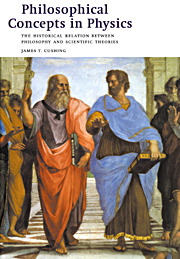 Philosophical Concepts in Physics
Philosophical Concepts in Physics Published online by Cambridge University Press: 05 June 2012
In this chapter we discuss a few of the classic views of science that were popular from the time of the Renaissance until the early part of the twentieth century and then indicate some later changes in the conception of science. We return to a more complete overview of the current status of the philosophy of science as a retrospective in Chapter 25.
ORIGINS OF SCIENTIFIC METHOD
In the previous chapter we used Bacon as an example of a proponent of what developed into one important aspect of the modern scientific method. We also referred to Descartes as the father of modern philosophy and scientific reasoning. Galileo is often credited as being the first working scientist to apply modern scientific method in his investigations. (Chapter 6 will discuss the scientific writings and research of Galileo.) Although it is simplest for purposes of exposition to focus on the works of specific individuals such as Bacon, Descartes or Galileo to illustrate the rise of modern scientific thought and practice, these seventeenth-century thinkers were not the first to break with Aristotelian tradition. They did have predecessors. For instance, in the thirteenth century an experimental dimension for science was already advocated by the English Franciscan friar Roger Bacon (c. 1220–1292). And, as we shall see in more detail in Chapter 6, some of the fourteenth-century Ockhamists in Paris applied mathematical methods to the problem of motion and obtained results that contributed to the foundations of modern mechanics and of calculus.
To save this book to your Kindle, first ensure [email protected] is added to your Approved Personal Document E-mail List under your Personal Document Settings on the Manage Your Content and Devices page of your Amazon account. Then enter the ‘name’ part of your Kindle email address below. Find out more about saving to your Kindle.
Note you can select to save to either the @free.kindle.com or @kindle.com variations. ‘@free.kindle.com’ emails are free but can only be saved to your device when it is connected to wi-fi. ‘@kindle.com’ emails can be delivered even when you are not connected to wi-fi, but note that service fees apply.
Find out more about the Kindle Personal Document Service.
To save content items to your account, please confirm that you agree to abide by our usage policies. If this is the first time you use this feature, you will be asked to authorise Cambridge Core to connect with your account. Find out more about saving content to Dropbox.
To save content items to your account, please confirm that you agree to abide by our usage policies. If this is the first time you use this feature, you will be asked to authorise Cambridge Core to connect with your account. Find out more about saving content to Google Drive.